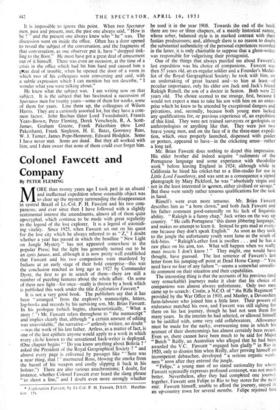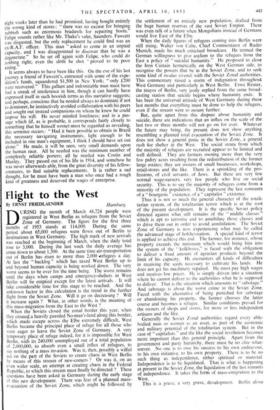Colonel Fawcett and Company
By PETER FLEMING MORE than twenty years ago I took part in an absurd and ineffectual expedition whose ostensible object was to clear up the mystery surrounding the disappearance in central Brazil of Lt.-Col. P. H. Fawcett and his two com- panions; and ever since then I have followed with a slightly sentimental interest the amendments, almost all of them quite apocryphal, which continue to be made with great regularity to the legend of the lost explorer. It is a legend of astonish- ing vitality. Since 1925, when Fawcett set out on his quest for the lost city which he always referred to as " Z," I doubt whether a year has passed in which the headline " New Light on Jungle Mystery " has not appeared somewhere in the popular Press; but the light has generally turned out to be an ignis fatuus, and, although it is now pretty well established that Fawcett and his two companions were murdered by Indians at an early stage of their bold enterprise—this was the conclusion reached as long ago as 1927 by Commander Dyott, the first to go in search of them—there are still a number of puzzling features about the whole affair. On some of them new light—for once—really is thrown by a book which is published this week under the title Exploration Fawcett.* It is not a very good book. The publishers say that it has been " arranged " from the explorer's manuscripts, letters, log-books and records by his surviving son, Mr. Brian Fawcett. In his prologue (which begins, characteristically, " What a story ! ") Mr. Fawcett refers throughout to " the manuscript " and implies clearly that, although " a certain amount of editing was unavoidable," the narrative—" artlessly written, no doubt" —was the work of his late father. Artless, as a matter of fact, is one of the last epithets anyone would apply to a work in which every cliché known to the sensational hack-writer is deployed. (One chapter begins " ' Do you know anything about Bolivia ? ' asked the President of the Royal Geographical Society ? " and almost every page is enlivened by passages like " ' Sure was a near thing, that ! ' murmured Ross, blowing the smoke from the barrel of his weapon and coolly slipping it back in his holster.") There are also various anachronisms; I doubt, for instance, whether Colonel Fawcett ever heard the slang phrase " to shoot a line:' and I doubt even more strongly whether • Exploration Fawcett, by Lt.-Col. P. H. Fawcett, D.S.O. Hutchin- son. 155. he used it in the year 1908. Towards the end of the book there are two or three chapters, of a mainly historical nature, whose sober, balanced style is in marked contrast with their fustian predecessors; and, although there is no reason to doubt the substantial authenticity of the personal experiences recorded in the latter, it is only charitable to suppose that a ghost-writer was responsible for vulgarising their protagonist. One of the things that always puzzled me about Fawcett's last expedition was his choice of companions. Fawcett was then 57 years old, an ex-regular soldier and a Founder's Medal- list of the Royal Geographical Society; he took with him, on an undertaking of great hazard and—to him at least--of peculiar importance, only his elder son Jack and Jack's friend Raleigh Rimell, the son of a doctor in Seaton. Both were 22 years old. The choice seemed to me strange, first, because I would not expect a man to take his son with him on an enter- prise which he knew to be attended by exceptional dangers and privations, and, secondly, because both young men lacked any, qualifications for, or previous experience of, an expedition of this kind. They were not trained surveyors or geologists or anthropologists or anything like that. They were just two brave young men, and on the face of it the three-man expedi- tion, which, once properly launched, dispensed with guides or porters, appeared to have—in the cricketing sense—rather a long tail.
Mr. Brian Fawcett does nothing to dispel this impression. His elder brother did indeed acquire " rudiments of the Portuguese language and some experience with theodolite work" before leaving England in 1924; although while in California he hired his cricket-bat to a film-studio for use in Little Lord Fauntleroy, and was sent as a consequence a signed photograph by Mary Pickford, he was " absolutely virgin and not in the least interested in %omen, either civilised or savage." But these were surely rather tenuous qualifications for the task in hand.
Rimell's were even more tenuous. Mr. Brian Fawcett describes him as " a born clown," and both Jack Fawcett and his father comment good-naturedly on his lack of linguistic ability. " Raleigh is a funny chap," Jack writes on the way up country. " He calls Portuguese ' this damn jabbering language,' and makes no attempt to learn it. Instead he gets mad at every- one because they don't speak English." As soon as they took to the jungle the unfortunate youth went lame as the result of tick-bites. " Raleigh's-other foot is swollen . . . and he has a raw place on his arm, too. What will happen when we really meet insects I don't know ! " They might, one would have thought, have guessed. The last sentence of Fawcett's last letter from his jumping-off point at Dead Horse Camp—" You need have no fear of any failure "—seems a somewhat unrealis- tic comment on their situation and their capabilities.
The interesting thing is that the accounts of his previous (and very remarkable) journeys make it clear that his choice of companions was almost always unfortunate. Only two men came up to scratch : Costin, a N.C.O. of " the Rifle Regiment " provided by the War Office in 1910, and Manley, a Devonshire farm-labourer who joined him a little later. Their powers of endurance matched his own, and Fawcett was still sighing for them on his last journey, though he bad not seen them for many years. In the interim he had selected, or allowed himself to be saddled with, some very odd collaborators. Allowance must be made for the narky, overweening tone in which his account of their shortcomings has almost certainly been recast. Even so, there cannot have been much to be said for Major " Butch " Reilly, an Australian who alleged that he had been awarded the V.C. Fawcett " engaged him gladly " in Rio in 1920, only to dismiss him when Reilly, after proving himself an incompetent debauchee, developed a serious organic weak- ness " soon after they entered the jungle. " Felipe," a young man of no stated nationality for whom Fawcett repeatedly expresses profound contempt, was not much better. Nevertheless, after they had completed one journey together, Fawcett sent Felipe to Rio to buy stores for the next on Fawcett himself, unable to afford the journey, stayed in an up-country town for several months. Felipe rejoined him eight weeks later than he had promised, having bought entirely the wrong kind of stores : " there was no excuse for bringing rubbish such as enormous bradawls for repairing boots." Felipe sounds rather like Mr. Thake's valet, Saunders. Fawcett was disgusted, but the only replacement he could find was an ex-R.A.F. officer. This man " asked to come in an unpaid capacity, and I was disappointed to discover that he was a degenerate." So he set off again with Felipe, who could do nothing right; even the sloth he shot " proved to be poor eating."
It seems always to have been like this. On the eve of his last journey a friend of Fawcett's, entrusted with some of the expe- dition's funds, squandered $1,500 in New York; " only £200 were recovered." This gallant and indomitable man must have had a streak of intolerance in him, though it can hardly have expressed itself in such boorish terms as this narrative suggests; and perhaps, conscious that he needed always to dominate if not to domineer, he instinctively avoided collaboration with his peers and sought out instead companions on whom he knew he could impose his will. He never minded loneliness; and in a pas- sage which (if, as is probable, it corresponds fairly closely to something that he himself wrote) must be regarded as revealing, this sentence occurs : " Had it been possible to obtain in Brazil the necessary navigating instruments, light enough to be included in one man's equipment, I think 1 should have set out alone." He made, it will be seen, very small demands upon the human race. All he needed was the minimum number of completely reliable porters; all he needed was Costin and Manley. They passed out of his life in 1914, and somehow he was never afterwards able, from the great diversity of his fellow- creatures, to find suitable replacements. It is rather a sad thought, for he must have been a man who once had a rough kind of greatness and deserved the wages of enterprise.



































 Previous page
Previous page